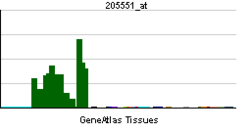SV2B
Synaptic vesicle glycoprotein 2B is a protein that in humans is encoded by the SV2B gene.[3][4][5]
See also
References
- ↑ "Human PubMed Reference:".
- ↑ "Mouse PubMed Reference:".
- ↑ Nagase T, Ishikawa K, Suyama M, Kikuno R, Miyajima N, Tanaka A, Kotani H, Nomura N, Ohara O (Apr 1999). "Prediction of the coding sequences of unidentified human genes. XI. The complete sequences of 100 new cDNA clones from brain which code for large proteins in vitro". DNA Res. 5 (5): 277–86. doi:10.1093/dnares/5.5.277. PMID 9872452.
- ↑ Bajjalieh SM, Peterson K, Linial M, Scheller RH (Apr 1993). "Brain contains two forms of synaptic vesicle protein 2". Proc Natl Acad Sci U S A. 90 (6): 2150–4. doi:10.1073/pnas.90.6.2150. PMC 46043
 . PMID 7681585.
. PMID 7681585. - ↑ "Entrez Gene: SV2B synaptic vesicle glycoprotein 2B".
Further reading
- Gerhard DS, Wagner L, Feingold EA, et al. (2004). "The status, quality, and expansion of the NIH full-length cDNA project: the Mammalian Gene Collection (MGC).". Genome Res. 14 (10B): 2121–7. doi:10.1101/gr.2596504. PMC 528928
 . PMID 15489334.
. PMID 15489334.
- Lazzell DR, Belizaire R, Thakur P, et al. (2005). "SV2B regulates synaptotagmin 1 by direct interaction.". J. Biol. Chem. 279 (50): 52124–31. doi:10.1074/jbc.M407502200. PMID 15466855.
- Strausberg RL, Feingold EA, Grouse LH, et al. (2003). "Generation and initial analysis of more than 15,000 full-length human and mouse cDNA sequences.". Proc. Natl. Acad. Sci. U.S.A. 99 (26): 16899–903. doi:10.1073/pnas.242603899. PMC 139241
 . PMID 12477932.
. PMID 12477932.
- Janz R, Goda Y, Geppert M, et al. (2000). "SV2A and SV2B function as redundant Ca2+ regulators in neurotransmitter release.". Neuron. 24 (4): 1003–16. doi:10.1016/S0896-6273(00)81046-6. PMID 10624962.
- Yu W, Andersson B, Worley KC, et al. (1997). "Large-scale concatenation cDNA sequencing.". Genome Res. 7 (4): 353–8. doi:10.1101/gr.7.4.353. PMC 139146
 . PMID 9110174.
. PMID 9110174.
- Andersson B, Wentland MA, Ricafrente JY, et al. (1996). "A "double adaptor" method for improved shotgun library construction.". Anal. Biochem. 236 (1): 107–13. doi:10.1006/abio.1996.0138. PMID 8619474.

 . PMID 7681585.
. PMID 7681585. . PMID 15489334.
. PMID 15489334. . PMID 12477932.
. PMID 12477932. . PMID 9110174.
. PMID 9110174.